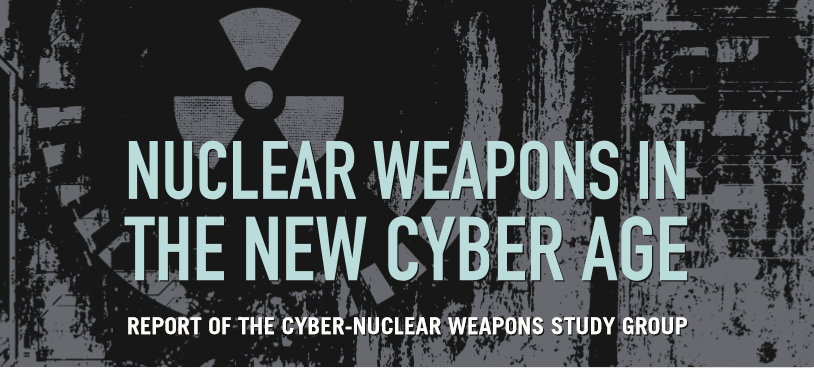WASHINGTON, DC—Nuclear weapons and related systems are increasingly vulnerable to sophisticated cyberattacks, and nuclear-armed states must cooperate and accelerate efforts to prevent an attack that could have catastrophic consequences, according to a new report from the Nuclear Threat Initiative (NTI), Nuclear Weapons in the New CyberAge: A Report of the Cyber-Nuclear Weapons Study Group.
The report finds that cyber threats to nuclear weapons and related systems—including nuclear planning systems, early warning systems, communication systems, and delivery systems—increase the risk of unauthorized use of a nuclear weapon, increase the risk of nuclear use as a result of false warnings, and could undermine confidence in the nuclear deterrent. This is because the speed, stealth, unpredictability, and challenges of attribution of any particular cyberattack make it increasingly difficult to anticipate, deter, and defend against all cyber threats.
“The world’s most lethal weapons are vulnerable to stealthy attacks from stealthy enemies—attacks that could have catastrophic consequences,” Study Group Co-Chairs Ernest J. Moniz, Sam Nunn, and Des Browne write in the foreword to the report. “Today, that fact remains the chilling reality. Cyber threats are expanding and evolving at a breathtaking rate, and governments are not keeping pace. It is essential that the U.S. government and all nuclear-armed states catch up with—indeed, get ahead of—this threat.”
The Study Group analyzed four plausible scenarios that illustrate the implications of the cyber threat to nuclear weapons. Using the scenarios as a framework for discussion and debate, NTI, with input from the Study Group, recommends that governments work to mitigate the threat by:
- Developing options to increase decision time to account for threats to early warning systems
- Establishing norms to restrict cyber weapons use against nuclear weapons systems
- Enhancing survivability and resilience of nuclear systems and command, control, and communications systems
- Securing and diversifying critical systems
- Prioritizing addressing cyber risks in modernization plans
- Maintaining a cadre of experts
- Enhancing security of nuclear weapons, and reviewing the vulnerabilities of nuclear weapons to combined physical and cyber attacks
- Initiating bilateral dialogue with Russia
- Increasing international cooperation to reduce the cyber threat.
“Addressing these threats will require changes to U.S. nuclear policies and posture,” the report says. “Moreover, because the implications to strategic stability have global effects and because other countries also face cyber threats, a global approach to address the problem is necessary.”
DOWNLOAD THE FULL REPORT: CLICK HERE
About the Cyber-Nuclear Weapons Study Group
NTI convened the Cyber-Nuclear Weapons Study Group in 2016 to identify cyber vulnerabilities of nuclear weapons systems and develop recommendations to reduce those vulnerabilities and the potential consequences of a cyberattack. The Study Group includes high-level former and retired government officials, military leaders, and experts in nuclear systems and policy. NTI Co-Chair and CEO Ernest J. Moniz, NTI Co-Chair Sam Nunn, and NTI Vice Chair Des Browne served as Study Group co-chairs.
About the Nuclear Threat Initiative
The Nuclear Threat Initiative works to protect our lives, environment, and quality of life now and for future generations. We work to prevent catastrophic attacks with weapons of mass destruction and disruption (WMDD)—nuclear, biological, radiological, chemical, and cyber. Founded in 2001 by former U.S. Senator Sam Nunn and philanthropist Ted Turner, who continue to serve as co-chairs, NTI is guided by a prestigious, international board of directors. Ernest J. Moniz serves as chief executive officer and co-chair, Des Browne is vice chair, and Joan Rohlfing serves as president.
FOR IMMEDIATE
RELEASE
Wednesday, September 26, 2018
CONTACT:
Cathy Gwin
202-454-7706, [email protected]





